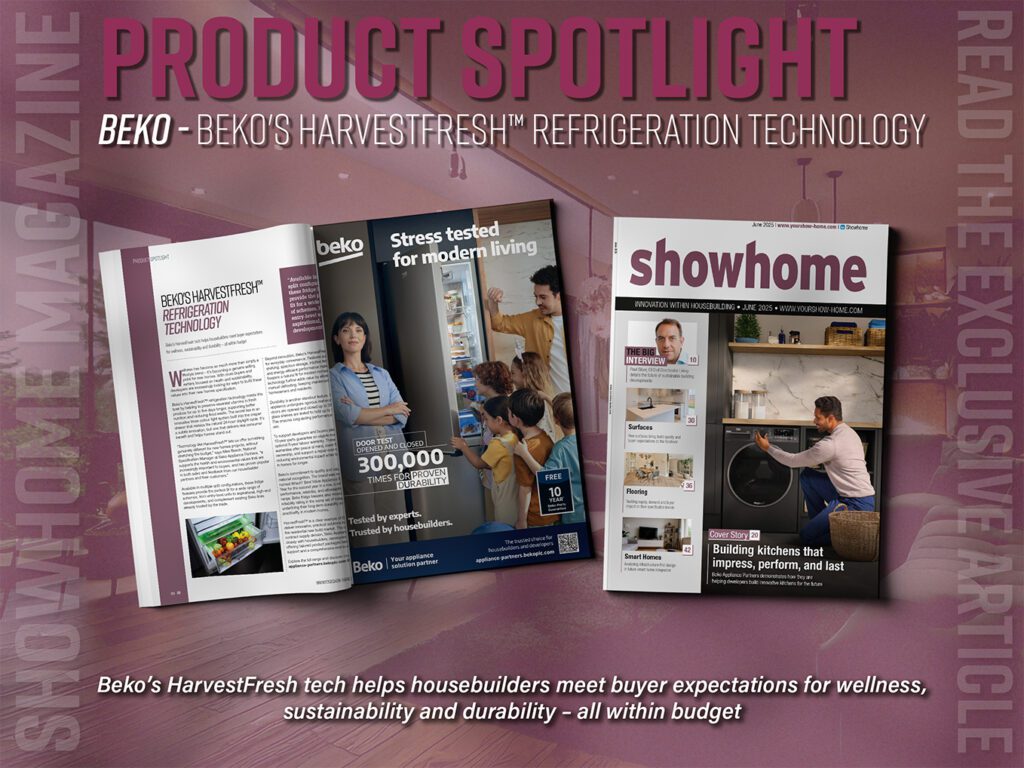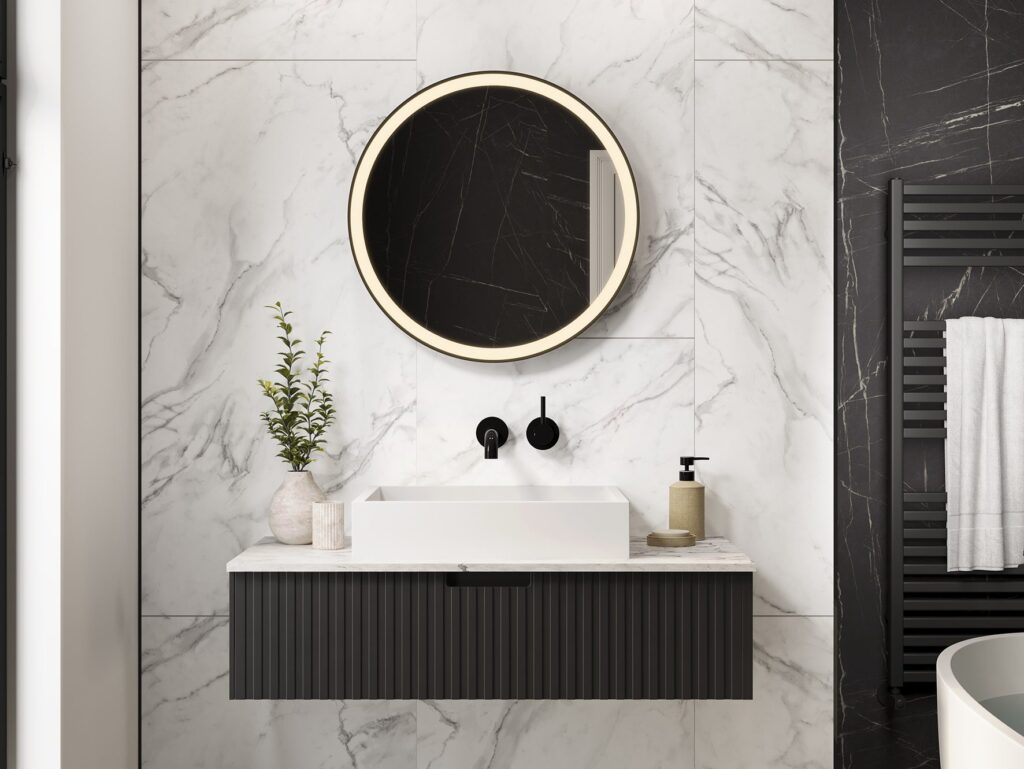Smart technology, sustainability measures, customisation options and health–orientated features are redefining our interaction with household appliances, reveals Showhome Managing Editor Rebecca Spayne
White goods and appliances are considered essential components of a new build home. They play a crucial role in making a home functional and liveable. While they might not be as visually striking as design elements or architectural features, they significantly contribute to the comfort and convenience of residents. Builders often include basic appliances like refrigerators, ovens, cooktops, dishwashers, and sometimes even washing machines and dyers in new homes. Providing these appliances not only adds value to the property but also appeals to potential buyers or tenants who expect a certain level of convenience when moving into a new place.
The presence and quality of these appliances can influence a buyer’s decision when comparing different properties. Modern, energy-efficient appliances, for example, can enhance the appeal of a new home, as they are not only convenient but also contribute to reduced utility bills and environmental sustainability. Ultimately, while they might not be the most glamorous aspect of a new build, white goods and appliances significantly impact the overall functionality and desirability of a home; and with constantly advancing technologies and changing demands of customers, they are not to be overlooked or underestimated.
As we step into 2024, the landscape of new-build homes is undergoing a significant transformation, particularly in the realm of white goods and appliances. The integration of cutting-edge technology and sustainability measures has become the cornerstone of modern home design, and this year promises a slew of exciting trends set to revolutionise our living spaces.
Smart appliances taking centre stage
The smart home revolution continues to gain momentum, and white goods are at the forefront of this evolution. In 2024, smart appliances are expected to become even more intuitive and interconnected, simplifying daily tasks while optimising energy efficiency.
AI-powered efficiency stands as a beacon of innovation with embedded artificial intelligence and machine learning algorithms empowering appliances to discern and adapt to user habits, dynamically optimising settings for peak efficiency. We can expect to see a greater number of new build kitchens fitted with refrigerators that discern temperature adjustments based on individual usage patterns or washing machines adeptly selecting optimal cycles for varied fabric types, all autonomously.
Beko Appliance Partners, that support housebuilders and developers with the specification of appliances for their new homes, have started to incorporate AI technology within their products to provide a more convenient user experience and adapt to consumers’ evolving lifestyles, with the development of this innovative technology forming a key part of the company’s product development roadmap moving forwards.
Mike Beech, Beko Appliance Partners’ National Contracts Specification Manager explains that the company are “keen to explore new ways in which smart appliances are able to reduce water consumption, improve efficiency and elevate performance whilst remaining competitively priced to accommodate increasingly challenging project budgets.” One example of them doing just this is through their AI-Sense technology in washing machines that automatically and intelligently identify the load weight, soil level, fabric type and rinse requirements of each load in order to optimise detergent, energy and water use, saving the end user time and money.
Next, interconnectivity has emerged as a defining feature. New-build homes will witness a seamless mesh of interconnected appliances like smart refrigerators that seamlessly communicate with ovens, intuitively suggesting recipes based on available ingredients, while orchestrating energy consumption during off-peak hours to curtail utility bills – an indispensable norm in modern households.
Mike Beech reveals that appliances like those offered by Beko now include connectivity capabilities through their HomeWhiz app. “Users are able to control and monitor their washing machine or dishwasher remotely using their smartphone or tablet via Bluetooth and the HomeWhiz app. The programme wizard selects the optimal wash cycle for each load, with new programmes available to download to match specific needs. For added convenience, the HomeWhiz app further enables users to set a specified finish time for the cycle to best suit their planned daily activities,” He explains.
Finally, voice and gesture control are also becoming an unparalleled convenience. The proliferation of intuitive control mechanisms such as voice commands and gesture recognition will redefine how residents interact with their appliances. Multitasking in the kitchen or laundry room will become effortless, as operations can be carried out with a simple voice command or a subtle hand gesture, seamlessly integrating technology into our daily routines.
Sustainability and Energy Efficiency
In response to the escalating focus on sustainability, the realm of white goods and appliances is aligning with eco-conscious initiatives, demonstrating a commitment to minimising environmental impact and fostering reduced energy consumption through multifaceted approaches.
Energy-saving innovations are set to redefine standards with the widely anticipated prevalence of cutting-edge appliances engineered for energy efficiency. House builders and housing developers are predicted to incorporate refrigerators fortified with enhanced insulation and equipped with low-power modes, designed to curtail energy usage without compromising performance. Washing machines, leveraging innovative technologies, will optimise water consumption, ensuring impeccable cleaning while minimising resource utilisation.
Having revealed two new energy-saving technologies at IFA 2023, Beko have demonstrated that they are reinventing the conventional laundry process to reduce home energy consumption. Akın Garzanlı, Chief Marketing Officer at Arçelik, Beko plc’s parent company, comments:
“Our latest products for both Beko and Grundig are utilising cutting-edge innovation and the most popular technology of the moment, AI. Beko’s EnergySpin is a gamechanger technology that stands out in the industry, while Grundig’s AI-Sense brings new dimensions to the concept of efficient washing. This new AI technology allows consumers to make small yet impactful choices using the most advanced and intelligent technology available.”
New technological solutions like these bring a more efficient washing process, releasing detergent upfront rather than relying heavily on heat to dissolve detergent and eliminate stains. It harnesses the power of faster-than-usual drum speeds to elevate the pace at which the detergent dissolves and eliminates the need for excessive heat generation during the wash in the machine’s most frequently used programmes. This results in up to 35% less energy consumption than conventional machines whilst maintaining high-quality cleaning performance.
Samsung are also at the head of innovation and smart technologies with their full range of kitchen appliances. Like BEKO, and most other home appliance manufacturers, Samsung appliances use AI-centred features to help users create sustainable homes by offering energy savings that surpass the highest industry rating. To give just one example, their refrigerators are now designed to reduce energy consumption and carbon emissions while still offering maximum food storage. These fridges are rated No.1 in energy efficiency in their category and are proven to provide an added 10% extra savings on top of the current highest energy rating standard.
In addition to smart technological systems like these, material innovation has become a cornerstone of sustainability, so forward-thinking manufacturers are embarking on a quest to discover and utilise sustainable materials in appliance construction. This concerted effort aims to drastically reduce the carbon footprint associated with manufacturing while ensuring durability and uncompromised performance. Thanks to this quest, we will see more and more appliances crafted from eco-friendly materials, setting a new benchmark for sustainability within new-build homes.
Customisation and Aesthetics
Beyond mere functionality, the realm of appliance design within new-build homes is entering a realm where aesthetics and customisation will command significant attention and influence.
Customisable Designs are poised to redefine personalisation: Envision appliances that transcend their utilitarian nature, offering a plethora of customizable finishes, textures, and modular elements. This level of flexibility empowers homeowners to curate fixtures that seamlessly integrate with their interior design preferences, allowing for an unprecedented level of personalization within the living space. From sleek metallic finishes to personalized colour schemes, appliances become not just functional entities but integral components of home decor, reflecting individual tastes and styles.
Beko Appliance Partners’ Mike Beech believes that “design preferences will change with time and from project to project. Integrated appliances allow kitchen designers to seamlessly blend these highly functional workhorses into any style and space, whatever aesthetic the developer wishes to achieve.” As open floorplans become more and more popular, as kitchens continue to serve a multitude of functions for modern living, appliances are required to be practical yet sleek tools rather than statement design pieces. Integrated solutions that can be “cleverly concealed within the sleek lines of a modern kitchen”, according to Mike, allow each individual design to “truly shine”.
Space-saving solutions are also evolving with innovation. The ever-growing demand for space optimisation in smaller homes or apartments without compromising functionality is driving the emergence of compact yet robust appliances. Picture multifunctional appliances designed with a meticulous focus on space efficiency. These innovative solutions encompass ingenious designs that maximize utility without occupying excessive floor space. From stackable washer-dryer units to versatile kitchen appliances that perform multiple tasks within a limited footprint, these space-saving marvels revolutionise the functionality of compact living spaces, catering to the evolving needs of modern homeowners.
Integration of Health and Wellness Features
A surge in health-consciousness is also catalysing a profound evolution in white goods, transforming them into not just appliances but allies in promoting a healthier lifestyle.
Air and water purification technologies herald a new era of wellbeing. Imagine appliances equipped with advanced built-in air purifiers or cutting-edge water filtration systems. These innovative features will go beyond their traditional functionalities, actively contributing to the creation of healthier indoor environments. From refrigerators incorporating air purification mechanisms to dishwashers boasting water filtration capabilities, these appliances will play a pivotal role in maintaining clean air and pristine water within homes, providing occupants with a healthier living space.
Thanks to the addition of these health-conscious integrations, “with options to suit every project budget, housebuilders and developers are able to inspire and support homeowners and residents to live healthier lifestyles with more nutritious meals than ever,” Beech adds.
Smart health monitoring introduces a new dimension to appliance functionalities. Anticipate appliances integrated with sophisticated health-monitoring capabilities. Imagine a scenario where kitchen appliances, such as smart stoves or cooking ranges, analyse nutritional content or cooking methods, offering users insights into their diets and recommending healthier cooking alternatives. These health-oriented features aim to empower users by not only facilitating daily chores but also by actively supporting their pursuit of a healthier lifestyle, seamlessly merging technology and wellness within the fabric of daily life.
The perfect example of this can be found in one of Samsung’s latest collaborations with Whisk to create the new Samsung Family Hub – a smart platform which uses advanced Food AI to first understand what’s in the fridge and then recommend a curated feed of recipes based on the ingredients in the fridge and the user’s preferences, desires and needs. In a recent press release, Nick Holzherr, Head of Product, Whisk at Samsung NEXT, reveals the worrying statistics that drive the design and creation of innovations like these:
“In the US an average person wastes 238 pounds of food per year – that’s a staggering 21 percent of the food they buy. Wasted ingredients also cost the average US household $1,800 per year. When coupled with the fact that people generally end up cooking the same 7-9 dishes on repeat, people are not being inspired to find creative solutions to use up leftover ingredients, wasting food, time and money. Whisk’s Food AI takes the ingredients you have and finds uses for them through an understanding of the kinds of recipes you enjoy, making your cooking experience simpler and smarter.”
The AI system will also be able to provide helpful nutritional information, such as the calorie intake for each individual snack or meal. With a growing awareness and desire to be healthier and fitter, fridges like these are expected to become an integral part of new build kitchens.
All in all, white goods and appliances are undergoing a remarkable metamorphosis, driven by technological innovation and a focus on sustainability and user convenience. As 2024 unfolds, the integration of smart technology, sustainability measures, customisation options, and health-oriented features will redefine the way we perceive and interact with household appliances, transforming our homes into smarter, more efficient, and healthier living spaces.
Read more news and exclusive features in our latest issue here.
Never miss a story… Follow us on:
Showhome
@Your_Show_Home
@Showhomemag
Media Contact
Joseph Clarke
Editor, Showhome
Tel: +44 (0) 1622 823 920
Email: [email protected]











